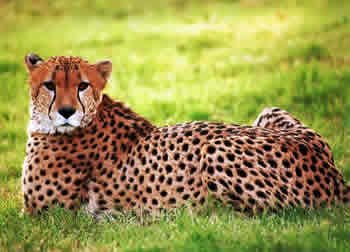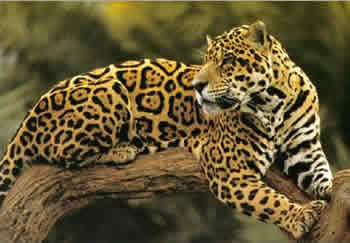Difference between Cheetah and Jaguar
Key Difference: Both Cheetah and Jaguar are essentially wild big cats. The main difference between both the animals is their black color in the body. Cheetahs are tan in color with black spots all over the bodies. On the other hand, Jaguars have larger rosette-shaped patterns along the side and back of the body.
 Cheetahs are the only big cat that cannot roar, and are the fastest animal in the world. Cheetahs can go from 0-60 miles per hour in three seconds. Cheetahs are tan in color with black spots all over their bodies. They can also be distinguished from other big cats by their smaller size, spotted coats, small heads, ears and distinctive "tear stripes" that stretch from the corner of the eye to the side of the nose. Cheetahs cannot climb trees and have poor night vision. The amazing fact is that they only need to drink once every three to four days.
Cheetahs are the only big cat that cannot roar, and are the fastest animal in the world. Cheetahs can go from 0-60 miles per hour in three seconds. Cheetahs are tan in color with black spots all over their bodies. They can also be distinguished from other big cats by their smaller size, spotted coats, small heads, ears and distinctive "tear stripes" that stretch from the corner of the eye to the side of the nose. Cheetahs cannot climb trees and have poor night vision. The amazing fact is that they only need to drink once every three to four days.
They have a very flexible build, with long legs, body, and tail. They are more nervous, cautious, and always on the look out. Cheetah's, like most animals in a competitive surroundings, have other adaptations developed eventually to make their niche and ensure their survival.
 The jaguar is the third-largest living Feline species, after the tiger and lion, and is also the largest feline in the Americas. The jaguars are compact and well-muscled animals. They are large, muscular felines and have short strong legs. Jaguars hunt individually, often springing from trees upon tapirs, capybaras, and peccaries. They either crush or suffocate the prey or bite straight through their skull. They also feed on fish and rabbits; some jaguars kill domestic cattle for food. About 3 and half months after mating, the female generally gives birth to two to four kittens.
The jaguar is the third-largest living Feline species, after the tiger and lion, and is also the largest feline in the Americas. The jaguars are compact and well-muscled animals. They are large, muscular felines and have short strong legs. Jaguars hunt individually, often springing from trees upon tapirs, capybaras, and peccaries. They either crush or suffocate the prey or bite straight through their skull. They also feed on fish and rabbits; some jaguars kill domestic cattle for food. About 3 and half months after mating, the female generally gives birth to two to four kittens.
They are thick, powerful and stocky in build. They are carnivorous stalk-and-ambush predators. The spots on the coat are more solid and black on the head and neck and become larger rosette-shaped patterns along the side and back of the body.
Comparison between Cheetah and Jaguar:
|
|
Cheetah |
Jaguar |
|
Scientific Name |
Acinonyx jubatus |
Panthera onca |
|
Family |
Felidae |
Felidae |
|
Genus |
Acinonyx |
Panthera |
|
Kingdom |
Animalia |
Animalia |
|
Phylum |
Chordata |
Chordata |
|
Class |
Mammalia |
Mammalia |
|
Order |
Carnivora |
Carnivora |
|
Protection status |
Endangered |
Near Threatened |
|
Weight |
Weight up to 35 to 65 kg |
Weight is 56 to 96 kg; Can go up to 160kg. |
|
Habitat |
Africa and parts of Middle East |
Southern United States and Mexico across much of Central America and south to Paraguay and northern Argentina. |
|
Build |
Tall and slender, head is smaller compared to the body. |
They are large muscular, have short strong legs. They are thick, powerful and stocky in build. |
|
Appearance |
The short fur of the cheetah is tan with round black spots. They are single large spots resembling thumb prints. |
Jaguars' base coat is usually tawny yellow, but can range to reddish-brown and black. |
|
Hunt |
They hunt at anytime – Either on daytime or at night. |
They will either crush or suffocate victim or bite straight through his skull. |
|
Hunting style |
It uses its incredible running ability to catch a daily meal, and it needs to be able to see what it is running after. |
Stalk-and-ambush predator. It also employees a unique method of biting through the temporal bones of the skull between the ears to kill the prey instantly. |
|
Vocalization |
Cheetah cannot roar, but instead of that he uses growling and yowling. |
Roars; Growls; purs |
|
Prey |
They are very fast and furious to catch their prey. They eat immediately after they kill any sized prey. Small antelope, young of large antelope, warthog, springhare, and game birds. |
Their diet consists of approximately 87 species. It includes Caimans, deer, capybaras, tapirs, peccaries, dogs, foxes, frogs, mice, birds anacondas, cattle, horses, fish, sloth, monkeys, and turtles, etc. |
|
Distinguishing differences |
Its coat is tan with small, round, black spots, and the fur is coarse and short |
Larger and darker rosettes, thicker lines and small spots in the middle. Rounder heads, shorter and stockier limbs. Tiny black dots inside the rosettes. |
Image Courtesy: animaltheory.blogspot.com, adambarraletsbloodygoodthingstoknow.blogspot.com









Add new comment